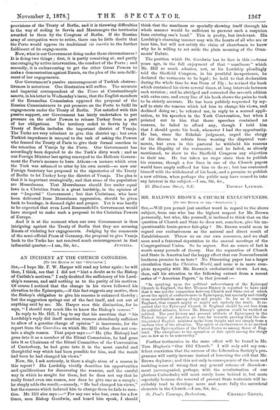AN INCIDENT AT THE CHURCH CONGRESS.
[TO THE EDITOR OF THE "SPECTATOR.']
hope Mr. F. W. Harper will read my letter again ; he will then, I think, see that I did not "hint a doubt as to the Bishop of Carlisle's motives." I only doubted the sufficiency of his Lord- ship's reasons, and said nothing as to the purity of his motives. of course I noticed that the change in his views followed his elevation to the Episcopate,—if this fact suggests any motive, then the Bishop's obligation to give his reasons is enhanced thereby ; but the suggestion springs out of the fact itself, and not out of anything said by me. Mr. Harper sees this distinction, for he says, "I should very much like to know the Bishop's reasons."
In reply to Mr. Hill, I beg to say that his assertion that "his Lordship's reply did itself mention reasons abundantly sufficient to allow of a genuine change of opinion" is inaccurate, for the report from the Guardian on which Mr. Hill relies does not con- tain a single reason. That paper says :—" He (the Bishop) had gone into it as a member of the Ritual Commission, he had gone into it as Chairman of 'the Ritual Committee of the Convocation of Canterbury, he had gone into it in the most careful and thoughtful way which had been possible for him, and the result had been he had changed his views."
Now, Sir, I ask seriously, is there a single atom of a reason in this report? His Lordship vividly describes his opportunities and qualifications for discovering the reasons, and the careful way in which he sought for them, but he does not say that he really found even one reason, nor does he give one as a sample ; he simply adds the result,—namely, "He had changed his views," but the reasons which induced him to change them he fails to men- tion. Mr. Hill also says :—" For any one who has, even for a few times, seen Bishop Goodwin, and heard him speak, I should
think that the manliness so specially showing itself through his whole manner would be sufficient to prevent such a suspicion from entering one's head." This is pretty, but irrelevant. His Lordship's charming manner may win the hearts of all who see or hear him, but will not satisfy the claim of churchmen to know why he is willing to set aside the plain meaning of the Orna- ments' Rubric.
The position which Dr. Goodwin has to face is this :—Some years ago, in the full enjoyment of that " manliness " which Mr. Hill so much admires, not, as his Lordship pleadingly told the Sheffield Congress, in his youthful inexperience, he declared the vestments to be legal ; he held to that declaration during the whole time he was Dean of Ely ; be revised the book which contained his views several times, at long intervals between each revision ; and he abridged and corrected the seventh edition with extra care, and every line of his book shows the pains he took to be strictly accurate. He has been publicly requested by my- self to state the reasons which led him to change his views, and declined doing so ; he referred me, in reply to a second appli- cation, to his speeches in the York Convocation, but when I pointed out to him that those speeches contained no reasons, he failed to afford any, though I told him that I should quote his book, whenever I had the opportunity. He has, since the Ridsdale judgment, urged the clergy of his diocese to refrain from wearing the disputed vest- ments, but even in this pastoral he withheld his reasons for the illegality of the vestments ; and he failed, as already mentioned, to show to the Sheffield Congress any objection to their use. He has taken no steps since then to publish his reasons, though a few lines in one of the Church papers would have amply sufficed for him to do so ; but has contented himself with the withdrawal of his book, and a promise to publish a new edition, when perhaps the public may have ceased to take any interest in the subject.—I am, Sir, &c.,


































 Previous page
Previous page